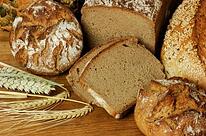 Do you know what a whole grain is? According to the Whole Grains Council, for a grain or food to be considered a whole grain, the entire grain seed must be included in the product. http://www.wholegrainscouncil.org/
Do you know what a whole grain is? According to the Whole Grains Council, for a grain or food to be considered a whole grain, the entire grain seed must be included in the product. http://www.wholegrainscouncil.org/
Whole grains offer unique health benefits that refined grains do not. Studies show that eating whole grains lowers the risk of several chronic diseases including heart disease, type 2 diabetes, asthma, inflammatory disease, gum disease and colorectal cancer.
September is Whole Grains Month, and the perfect time to incorporate whole grains into your diet. To get started, consider purchasing products advertised as 100 percent whole grain, whole wheat or stoneground whole.
DID YOU KNOW
The following are generally considered examples of whole grains when consumed in a form that includes the entire kernel:
http://www.wholegrainscouncil.org/whole-grains-101/identifying-whole-grain-products
• Amaranth
• Barley
• Buckwheat
• Corn
• Millet
• Oats
• Quinoa
• Rice
• Rye
• Sorghum
• Teff
• Triticale
• Wheat
• Wild rice

